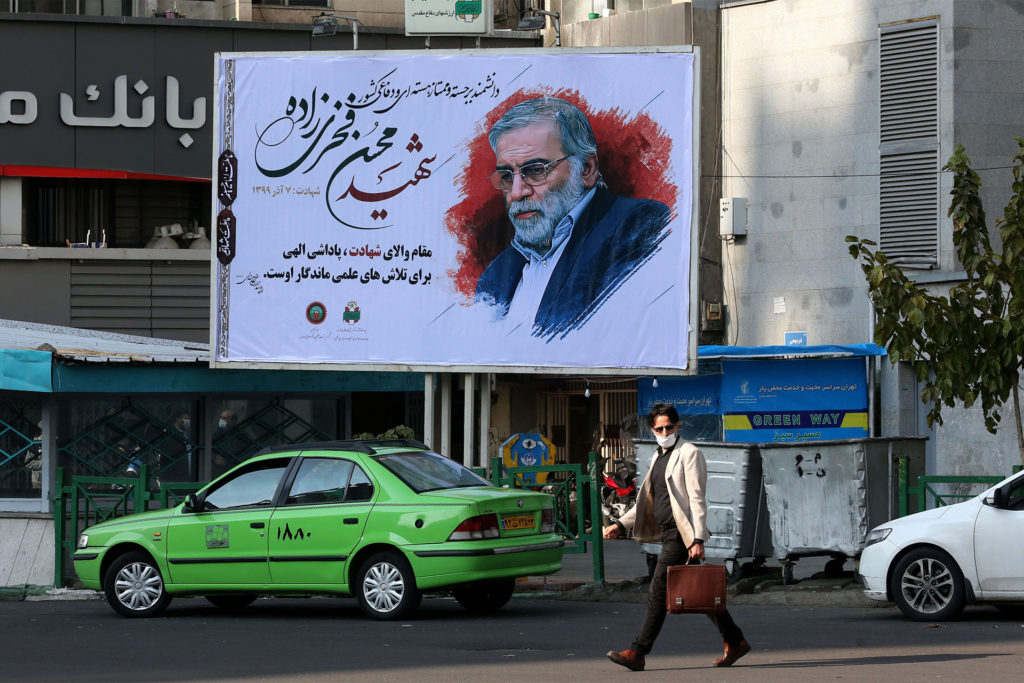What just happened

- Russia opened a murder investigation after the daughter of a key Putin ally was killed in a car blast (more below).
- Pakistan filed terrorism charges against former leader Imran Khan as he holds mass rallies in a bid to return to office.
- Singapore announced it would decriminalise sex between men but said it would not recognise same-sex marriages.
27 November 2020 started like any other day for Mohsen Fakhrizadeh. He got up just before dawn to begin his regular reading routine. That afternoon, he planned to drive his wife to their holiday home by the Caspian Sea.
But Iran’s top nuclear scientist never made it because he was assassinated by Israeli intelligence agency, Mossad, using a pre-positioned machine gun remotely controlled from Israel.
For the Israeli government, preventing Iran from obtaining a nuclear weapon at all costs has been paramount. Talks to revive the 2015 nuclear deal start and stop in Vienna, and now appear to be making significant progress – the European Union’s draft text is currently being reviewed by the United States. But Mossad is taking no chances. Through assassinations and sabotage, it has attempted to slow the progress of Iran’s nuclear programme for years.
Those attacks have now escalated in what former Prime Minister Naftali Bennet calls the “Octopus Doctrine”.
Target Iran. In 2010, jointly with the US, Israeli intelligence destroyed an estimated 1,000 uranium centrifuges in a cyberattack using Stuxnet malware on the Natanz uranium enrichment plant. Experts said at the time that Stuxnet delayed Iran’s nuclear progress by up to two years.
Before the signing of the 2015 nuclear deal known as the Joint Comprehensive Plan of Action (JCPOA), Israel was involved in the targeted assassinations of five Iranian nuclear scientists.
While the JCPOA was in force, Israel focused much of its attention on preventing weapons smuggling from Iran via Syria to the militant group Hezbollah in Lebanon. Then Trump withdrew from the deal in 2018 and containing the Iranian nuclear threat became a niche Israeli specialism rather than a global campaign, beginning with another sabotage incident at Natanz in April 2021.
Operation Octopus. Since the assassination of Fakhrizadeh, Mossad operations inside Iran have become close to routine. On 7 June, Israel’s former prime minister Naftali Bennett told the Knesset foreign affairs and defence committee: “The days in which Iran repeatedly hurts Israel, spreads terror through branches in our area, and comes out unharmed, are over… We are operating everywhere, at all times, and we will continue doing so.”
Israel has extended its attacks to allegedly assassinate members of Iran’s Revolutionary Guards’ (IRGC) foreign arm known as the Quds Force as well as officers and engineers involved in its drone and ballistic missile programmes:
- In May, a colonel in the Quds Force was assassinated outside his home. The colonel was reportedly deputy commander of the covert Unit 840 tasked with transnational abductions and assassination of foreigners, including Israelis.
- Other suspicious deaths the same month included the killing of a defence ministry engineer in a drone strike inside Iran; a senior member of the IRGC falling to his death from a balcony; and the poisoning of an aeronautical engineer and geologist.
- In June, two IRGC aerospace engineers working on Iran’s missile programme died separately in mysterious circumstances.
Iran blames Israel for all these deaths.
Heads roll. On 24 June the head of the IRGC’s powerful intelligence arm, Hossein Taeb, was dismissed. He’d been in the role since 2009 and the shake-up appeared to be a result of the ministry’s embarrassing inability to catch the assassins – and because of concerns of penetration by Israeli intelligence in Iran’s security apparatus.
In retaliation, Iran-backed hacking groups have targeted Israeli infrastructure, including Israel’s water system in June 2021. They were suspected of causing false siren alerts in West Jerusalem and Eilat in June this year. Most concerning was a foiled Iranian plot, thought to have been masterminded by Taeb, to kill or kidnap Israeli tourists visiting Turkey.
Learning by doing. The indirect conflict between Iran and Israel is playing out in the open though it hasn’t led to direct war – yet. “We no longer play with the tentacles… we’ve created a new equation by going for the head,” Bennett said of the Octopus Doctrine.
But when an octopus loses its tentacles, another grows in its place. The same could be said of Iran’s nuclear programme. It may have slowed down but it keeps getting built back up, and Fakhrizadeh’s successors keep learning.
Holly Dagres is a nonresident senior fellow at the Atlantic Council and editor of IranSource